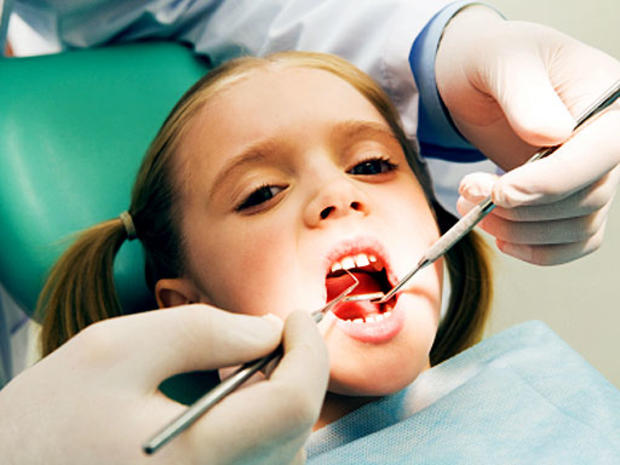BPA in tooth fillings may boost kids' behavioral problems
(CBS) BPA, or bisphenol-A, is a chemical found in cans and other food packaging that has been linked to health risks such as cancer and birth defects and the disruption of normal development in babies and kids. Now, a new study in the July 16 issue of Pediatrics links the BPA that is used in certain types of children's tooth fillings to a slightly increased risk for behavioral problems.
Can "Keep 32" chemical keep you cavity-free?
More preschoolers showing up to dentists with 10 cavities or more, says report
BPA tied to behavior problems in girls, but how about boys?
After a five year follow-up period, children with the highest exposure to BPA-based fillings scored worse on behavioral assessment tests and had more emotional problems like anxiety and depression than their counterparts. In all, 16 percent of kids with the most BPA-exposure had behavioral problems. The association was stronger in kids who had fillings on chewing surfaces, which suggests the filling was more likely to break down with chemicals possibly seeping out.
"It's a controversial topic in dental research, how much really does leach (from fillings)... and whether or not that would have an effect," study author Dr. Nancy Maserejian, a scientist at New England Research Institutes in Watertown, Mass., told Reuters.
"It's generally assumed that the amounts leached are tiny," she said, adding that BPA-based fillings are becoming more popular because they are teeth-colored.
The study involved 534 children between ages 6 and 10. Several of the children had dental amalgam fillings, which have been used for more than 150 years in hundreds of millions of patients and are sometimes called "silver fillings." They were compared to kids with newer types of fillings: one called a componer, which is made of a urethane dimethacrylate-based polyacid-modified composite, and another made of a bisphenol A-glycidyl methacrylate (bisGMA)-based composite, which contains BPA.
Some concerns have been raised over amalgam ("silver") fillings because they contain mercury, but the FDA does not recommend their removal if they are in good condition. The study showed no associations were seen between behavioral test scores and the componers or silver fillings.
Maserejian told HealthDay the differences in behavior were small but may be significant.
"On average, the difference in social behavior scores were very small and would probably not be noticed for each individual child," she said. "But imagine a huge group of children around the country; you'd probably notice a difference."
BPA has been tied to health risks to the reproductive and nervous systems in babies and small children and have been shown to raise risk for cancer and other diseases found in animal studies. Estimates suggest 90 percent of Americans have BPA traces in their body because it's found in bottles, cans and other food containers.
The Food and Drug Administration recently denied a petition from the Natural Resources Defense Council to ban BPA in food packaging, saying there's not enough evidence that the BPA health effects in rodent and animal studies might apply to humans.
Dr. Paul Casamassimo, director of the American Academy of Pediatric Dentistry's Pediatric Oral Health Research and Policy Center, told WebMD more research was needed to validate the findings over a long-term period.
"We need to be constantly vigilant with kids and look at what we do and find out if these are valid findings over the long term," he said.
Recent reports suggest an uptick in the number of preschool-aged children with multiple cavities, sometimes more than 10, who require treatments at such a young age.
For those worried about BPA-exposure risk from fillings, many dentists agree the way to reduce risk is to reduce getting cavities in the first place.
"I'm going to use this study as another educational opportunity," Dr. Mary Hayes, a Chicago-based pediatric dentist and spokesperson for the American Dental Association who was not involved in the new research, told The Daily Beast of cavity prevention. "The best tooth material is your own."
The Mayo Clinic has more on preventing cavities.
